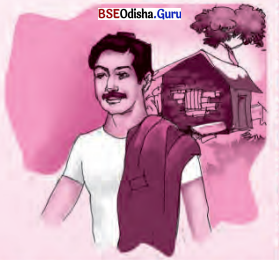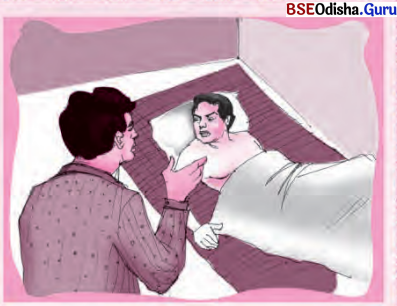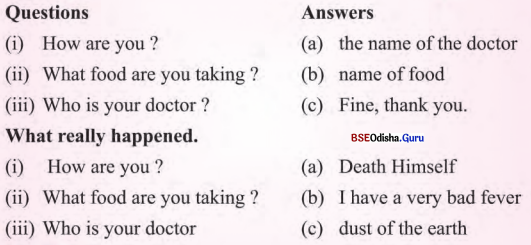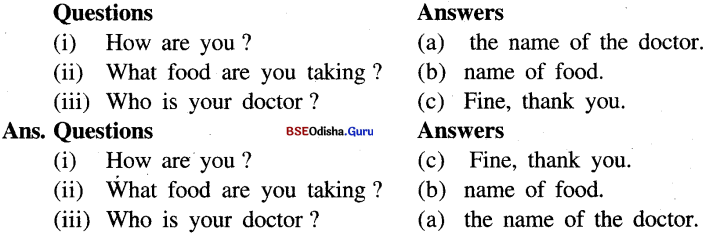Odisha State Board BSE Odisha 6th Class English Solutions Lesson 4 The Deaf Friend Textbook Exercise Questions and Answers.
Class 6th English Chapter 4 The Deaf Friend Question Answers BSE Odisha
The Deaf Friend Class 6 Questions and Answers
Session – 1 ( ସୋପାନ – ୧)
I. Pre-Reading (ପଢ଼ିବା ପୂର୍ବରୁ):
Listen to this Story: One person went to England. He did not know English except for three words/phrases- ‘Yes’, ‘No’, and ‘Very good’. There was a street fight one day. He was present there. The police, therefore, caught him. The police asked him, “Did you take part in the fight?”He, without understanding the question, answered ‘Yes’. The police took him to the police station.

The inspector there asked him, ‘Look, people say you took part in the fight. Do you want to say anything against this charge ?’ He said, ‘No’. When the inspector said, ‘You will be sent to prison’. The man said, ‘Very good’.
![]()
(ଏହି ଗପଟିକୁ ମନଦେଇ ଶୁଣ : ଜଣେ ବ୍ୟକ୍ତି ଇଂଲଣ୍ଡକୁ ଯାଇଥିଲେ । ସେ ତିନିଟି ଶବ୍ଦ ଶବ୍ଦ | ଖଣ୍ଡବାକ୍ୟ ‘ହଁ’ (Yes), ‘ନା’ (No), ‘ବହୁତ ଭଲ’ (very good) ବ୍ୟତୀତ ଅନ୍ୟ କିଛି ଇଂରାଜୀ ଜାଣି ନଥିଲେ । ଦିନେ ସେଠାରେ ଏକ ବସ୍ତି ଗଣ୍ଡଗୋଳ ହେଲା । ସେ ସେଠାରେ ଉପସ୍ଥିତ ଥିଲେ । ଏଣୁ ପୋଲିସ୍ ତାକୁ ଧରିଲା । ପୋଲିସ୍ ତାକୁ ପଚାରିଲା, ‘ତୁମେ ଗଣ୍ଡଗୋଳରେ ଭାଗ ନେଇଥିଲ କି ?’’ ସେ, ପ୍ରଶ୍ନଟିକୁ ନବୁଝି ଉତ୍ତର ଦେଲା ‘ହଁ’
। ପୋଲିସ୍ ତାଙ୍କୁ ଥାନାକୁ ନେଇଗଲେ । ସେଠାରେ ଥିବା ଇନିସ୍ପେକ୍ଟର ତାଙ୍କୁ ପଚାରିଲେ, ‘ଦେଖ, ଲୋକମାନେ କହୁଛନ୍ତି ତୁମେ ଗଣ୍ଡଗୋଳରେ ଭାଗ ନେଇଥିଲେ । ତୁମେ ଏହି ଅଭିଯୋଗ ବିରୋଧରେ କିଛି କହିବାକୁ ଚାହଁ କି ?’’ ସେ କହିଲା, ‘ନା’’ । ଯେତେବେଳେ ଇନ୍ସ୍ପେକ୍ଟର୍ କହିଲେ, ‘ତୁମକୁ ଜେଲକୁ ପଠାଯିବ ।’’ ଲୋକଟି କହିଲା, ‘ବହୁତ ଭଲ’’ ।)
Now we will read a story that is similar to what you have listened to just now.
(ଏବେ ଗପଟିଏ ପଢ଼ିବା ଯାହାକି ତୁମେ ବର୍ତ୍ତମାନ ଶୁଣିଥିବା ଗପ ଭଳି ।)
II. While-Reading (ପଢ଼ିବା ସମୟରେ)
Text – (ପାଠ୍ୟବସ୍ତୁ)
Read paragraphs 1-2 silently and answer the questions that follow
(ଅନୁଚ୍ଛେଦ ୧-୨ କୁ ନୀରବରେ ପଢ଼ ଏବଂ ପରବର୍ତ୍ତୀ ପ୍ରଶ୍ନଗୁଡ଼ିକର ଉତ୍ତର ଦିଅ ।)
1. Once there lived a poor man in a village. He had a rich classmate. He lived in a town. They did not meet for a long time. In the meantime, the rich friend had problems with his ear and became deaf. His friend in the village could not know this. One day the rich friend came to know that his friend was seriously ill. So he decided to visit him.
2. The rich friend thought to himself, “How can I talk to him? I cannot hear what he will say.” He decided to talk less and carefully planned his talk. “I’ll say “Good morning. How are you? ‘He’ll say, ‘Fine, thank you’. Then I’ll say “That’s good.” Then I’ll ask what food are you taking. He’ll name the food he is taking. That’s good for you. Finally, I’ll ask, ‘Who is your doctor?’ He’ll tell the name of his doctor. I’ll say, ‘I hope God will help him with his work’.”
![]()
ଓଡ଼ିଆ ଅନୁବାଦ :
(୧) ଏକଦା ଜଣେ ଗରିବ ଲୋକ ଏକ ଗ୍ରାମରେ ବାସ କରୁଥିଲେ । ତାଙ୍କର ଜଣେ ଧନୀ ସହପାଠୀ ଥିଲେ । ସେ ଏକ ସହରରେ ବାସ କରୁଥିଲେ । ସେମାନଙ୍କର ବହୁଦିନ ହେଲା ସାକ୍ଷାତ ହୋଇନଥିଲା । ଇତ୍ୟବସରରେ (ଏହି ସମୟ ମଧ୍ୟରେ) ଧନୀ ବ୍ୟକ୍ତିଟିର କାନରେ ସମସ୍ୟା ସୃଷ୍ଟି ହେଲା ଏବଂ ସେ ବଧୂର ହୋଇଗଲା । ଗ୍ରାମରେ ଥିବା ତା’ର ବନ୍ଧୁ ଏ ବିଷୟରେ ଜାଣିପାରି ନଥିଲେ । ଦିନେ ଧନୀ ବନ୍ଧୁ ଜାଣିବାକୁ ପାଇଲେ ଯେ ତାଙ୍କ ବନ୍ଧୁ ଗୁରୁତର ଅସୁସ୍ଥ ଅଛି । ତେଣୁ ସେ ତାଙ୍କୁ ସାକ୍ଷାତ କରିବାକୁ ସ୍ଥିର କଲେ ।
(୨) ଧନୀ ବନ୍ଧୁ ଜଣକ ନିଜକୁ ନିଜେ ଭାବିଲେ, ‘ମୁଁ ତା’ ସହିତ କିପରି କଥାବାର୍ତ୍ତା ହେବି ? ସେ ଯାହା କହିବ ମୁଁ ତ ଶୁଣିପାରିବି ନାହିଁ ।’’ ସେ କମ୍ କଥାବାର୍ତ୍ତା ହେବାକୁ ସ୍ଥିର କଲେ ଏବଂ ଯତ୍ନ ସହକାରେ କ’ଣ କଥା ହେବେ ଯୋଜନା କଲେ । ‘ମୁଁ କହିବି, ‘‘ସୁପ୍ରଭାତ । ତୁମେ କେମିତି ଅଛ ?’’ ସେ କହିବ, ‘ବହୁତ ଭଲ, ତୁମକୁ ଧନ୍ୟବାଦ ।’’ ତା’ପରେ ମୁଁ କହିବି, ‘ତାହା ବହୁତ ଭଲ ।’’ ତା’ପରେ ମୁଁ ପଚାରିବି, ‘ତୁମେ କେଉଁ ଖାଦ୍ୟ ଖାଉଛ ?’’ ସେ ଯେଉଁ ଖାଦ୍ୟ ଖାଉଛି ତା’ର ନାମ କହିବ । ସେଇଟା ତୁମପାଇଁ ଭଲ । ଶେଷରେ ମୁଁ ପଚାରବି, ‘ତୁମର ଚିକିତ୍ସକ କିଏ ?’’ ସେ ତା’ର ଚିକିତ୍ସକଙ୍କର ନାମ କହିବ । ମୁଁ କହିବି, ‘ମୁଁ ଆଶା କରୁଛି ଈଶ୍ବର ତାଙ୍କୁ ତାଙ୍କର କାମରେ ସାହାଯ୍ୟ କରନ୍ତୁ ।’’
Comprehension Questions – (ବୋଧମୂଳକ ପ୍ରଶ୍ନବଳୀ) :
Question 1.
Who are there in these paragraphs ?
(ଏହି ଅନୁଚ୍ଛେଦଗୁଡ଼ିକରେ କେଉଁମାନେ ଅଛନ୍ତି ?)
Answer:
In these paragraphs, there are two persons. They are the poor man and his rich classmate.
Question 2.
Where did the rich friend live?
(ଧନୀ ବନ୍ଧୁଜଣକ କେଉଁଠାରେ ବାସ କରୁଥିଲେ ?)
Answer:
The rich friend lived in a town.
Question 3.
Where did the poor friend live ?
(ଗରିବ ବନ୍ଧୁଟି କେଉଁଠାରେ ବାସ କରୁଥିଲା ?)
Answer:
The poor friend lived in a village.
![]()
Question 4.
What happened to the rich friend?
(ଧନୀ ବନ୍ଧୁଙ୍କର କ’ଣ ହେଲା ?)
Answer:
The rich friend had problems with his ear and became deaf.
Question 5.
Did his poor friend in the village know about his problem?
(ଗ୍ରାମରେ ଥିବା ତାଙ୍କର ଗରିବ ବନ୍ଧୁ ତାଙ୍କର ସମସ୍ୟା ବିଷୟରେ ଜାଣିଥୁଲେ କି ?)
Answer:
No, his poor friend in the village did not know about his problems.
Question 6.
Did the rich friend want to tell his friend about his deafness? Why?
(ଧନୀ ବନ୍ଧୁ ଜଣକ ତାଙ୍କ ବନ୍ଧୁଙ୍କୁ ତାଙ୍କ ବଧୂର ହୋଇଯିବା କଥା କହିବାକୁ ଚାହୁଁଥିଲେ କି ? କାହିଁକି ?)
Answer:
No, the rich friend did not want to tell his friend about his deafness. Because he did not want to tell anybody about his problem or weakness.
Question 7.
What did the rich friend come to know about his friend?
(ଧନୀ ବନ୍ଧୁ ଜଣକ ତାଙ୍କର ବନ୍ଧୁଟି ବିଷୟରେ କ’ଣ ଜାଣିବାକୁ ପାଇଲେ ?)
Answer:
The rich friend came to know that his friend was seriously ill.
Question 8.
What did he decide to do?
(ସେ କ’ଣ କରିବାକୁ ସ୍ଥିର କଲେ ?)
Answer:
He decided to visit his poor friend living in the village.
![]()
Question 9.
Why did he decide to talk less?
(କାହିଁକି ସେ କମ୍ କଥା କହିବାକୁ ସ୍ଥିର କଲେ ?)
Answer:
He decided to talk less because he could not hear what his poor friend would say.
Question 10.
If he says, “How are you ?” to his friend, what will be his friend’s reply?
(ଯଦି ସେ ତା’ର ବନ୍ଧୁଙ୍କୁ ‘ତୁମେ କିପରି ଅଛ ?”’ ବୋଲି କହେ, ତାଙ୍କ ବନ୍ଧୁଙ୍କର ଉତ୍ତର କ’ଣ ହେବ ?)
Answer:
If he says, “How are you ?” to his friend, his friend’s reply will be, “Fine, thank you.”
Question 11.
What did he decide to say next?
(ତା’ପରେ ସେ କ’ଣ କହିବାକୁ ସ୍ଥିର କଲେ ?)
Answer:
Then he decided to say “That’s good”.
Question 12.
When his friend says what food he is taking, what will he say?
(ଯେତେବେଳେ ତାଙ୍କର ବନ୍ଧୁ କହିବେ କେଉଁ ଖାଦ୍ୟ ସେ ଖାଉଛନ୍ତି, ସେ କ’ଣ କହିବେ ?)
Answer:
When his friend says what food he is taking, he will say, “That’s good for you.”
Question 13.
What did he decide to ask finally?
(ଶେଷରେ ସେ କ’ଣ ପଚାରିବାକୁ ସ୍ଥିର କଲେ ?)
Answer:
Finally, he decided to ask, “Who is your doctor ?”
![]()
Question 14.
What would his friend reply to this ?
(ତାଙ୍କର ବନ୍ଧୁ ଏହାର କ’ଣ ଉତ୍ତର ଦେବେ ?)
Answer:
His friend would tell him the name of his doctor in reply.
Question 15.
When his friend tells him the name of the doctor, what would he decide to say?
(ଯେତେବେଳେ ତାଙ୍କ ବନ୍ଧୁ ଚିକିତ୍ସକଙ୍କର ନାମ କହିବେ, ସେ କ’ଣ କହିବାକୁ ସ୍ଥିର କଲେ ?)
Answer:
When his friend tells him the name of the doctor, he would decide to say, “I hope God will help him with his work.
Session – 2 ( ସୋପାନ – ୨)
Read paragraph 3 (dialogues) silently and answer the questions that follow.
(ଅନୁଚ୍ଛେଦ – ୩ (ସଂଳାପଗୁଡ଼ିକ) ନୀରବରେ ପଢ଼ ଏବଂ ପରବର୍ତ୍ତୀ ପ୍ରଶ୍ନଗୁଡ଼ିକର ଉତ୍ତର ଦିଅ ।)
3. The rich friend arrived at his friend’s house. The two friends started talking to each other.
Rich friend: “Good morning, my dear friend. How are you ?”
Poor friend: “I have a very bad fever. I can’t sleep at night”.
Rich friend: “That’s good. What food are you taking ?”
Poor friend: (with anger) “The dust of the earth”.
Rich friend: (smilingly) “That’s good for you. And who is your doctor ?”
Poor friend: (losing his temper) “Death himself”.
Rich friend: “I hope God will help your doctor with his work”.
Saying so, he left his friend with great pleasure. He thought his plan had worked well and his friend could not know that he was deaf.

ଓଡ଼ିଆ ଅନୁବାଦ :
(୩) ଧନୀ ବନ୍ଧୁ ଜଣକ ତାଙ୍କ ସାଙ୍ଗର ଘରେ ଆସି ପହଞ୍ଚିଲେ । ଦୁଇ ବନ୍ଧୁ ପରସ୍ପର ମଧ୍ୟରେ କଥାବାର୍ତ୍ତା ଆରମ୍ଭ କଲେ ।
ଧନୀ ବନ୍ଧୁ: ‘‘ସୁପ୍ରଭାତ, ମୋ ପ୍ରିୟ ବନ୍ଧୁ । ତୁମେ କିପରି ଅଛ ?’’
ଗରିବ ବନ୍ଧୁ: ମୋତେ ଭୀଷଣ ଜ୍ଵର ହୋଇଛି । ମୁଁ ରାତିରେ ଶୋଇ ପାରୁନାହିଁ ।
ଧନୀ ବନ୍ଧ: “ସେଇଟା ବହୁତ ଭଲ । ତୁମେ କେଉଁ ଖାଦ୍ୟ ଖାଉଛ ?’’
ଗରିବ ବନ୍ଧ: (ରାଗିଯାଇ) ‘‘ପୃଥିବୀର ଧୂଳି ।’’
ଧନୀ ବନ୍ଧୁ: (ହସି ହସି) “ସେଇଟା ତୁମ ପାଇଁ ଭଲ ଅଟେ । ଏବଂ ତୁମର ଡାକ୍ତର କିଏ ?”
ଗରିବ ବନ୍ଧ: (କ୍ରୋଧ ସମ୍ଭାଳି ନପାରି) ‘‘ମୃତ୍ୟୁ ନିଜେ’’
ଧନୀ ବନ୍ଧୁ: ‘‘ମୁଁ ଆଶା କରୁଛି ଈଶ୍ଵର ତୁମ ଡାକ୍ତରଙ୍କୁ ତାଙ୍କ କାମରେ ସାହାଯ୍ୟ
ସେହିପରି କହି, ବହୁତ ଆନନ୍ଦରେ ସେ ତାଙ୍କ ବନ୍ଧୁଙ୍କ ପାଖରୁ ଫେରିଆସିଲେ । ସେ ଭାବିଲେ ତାଙ୍କର ଯୋଜନାଟି ଭଲ କାମ କଲା ଏବଂ ସେ କାଲ ବୋଲି ତାଙ୍କ ବନ୍ଧୁ ଜାଣି ପାରିନଥିବେ ।
![]()
Comprehension Questions – (ବୋଧମୂଳକ ପ୍ରଶ୍ନବଳୀ) :
Question 1.
What did his friend say when he said, “How are you”?
(ତାଙ୍କର ବନ୍ଧୁ କ’ଣ କହିଲେ ଯେତେବେଳେ ସେ କହିଲେ, ‘‘ତୁମେ କିପରି ଅଛ ?’’)
Answer:
When he said, “How are you ?” his friend said that he had a very bad fever and he couldn’t sleep at night.
Question 2.
Could he hear what his friend said?
(ଯାହା ତାଙ୍କର ବନ୍ଧୁ କହିଲେ ସେ ଶୁଣି ପାରୁଥିଲେ କି ?)
Answer:
No, he could not hear what his friend said.
Question 3.
Why was he not happy ?
(କାହିଁକି ସେ ସୁଖୀ ନଥିଲେ ?)
Answer:
He (the friend) was not happy because his dear friend gave him a bad/ unwanted complement/remark
![]()
Question 4.
Why did the poor friend say, ‘The dust of the earth’?
(କାହିଁକି ଗରିବ ବନ୍ଧୁଟି କହିଲା, ‘‘ପୃଥିବୀର ଧୂଳି’’ ?)
Answer:
The poor friend said, “The dust of the earth” because he was angry with his friend’s remark.
Question 5.
Could his friend hear this?
(ତାଙ୍କର ବନ୍ଧୁ ଏହା ଶୁଣିପାରିଲେ କି ?)
Answer:
No, his friend couldn’t hear this.
Question 6.
What did the rich friend say ?
(ଧନୀ ବନ୍ଧୁଜଣକ କ’ଣ କହିଲେ ?)
Answer:
The rich friend said, “That’s good for you”. (Or) The rich friend said that was good for his friend.
Question 7.
What did the rich man ask next?
(ତା’ପରେ ଧନୀ ଲୋକ କ’ଣ ପଚାରିଲେ ?)
Answer:
Next, the rich man asked, “Who is your doctor ?” (Or) Next, the rich man asked the name of his doctor.
Question 8.
What did the sick man reply?
(ସେହି ଅସୁସ୍ଥ ଲୋକଟି କ’ଣ ଉତ୍ତର ଦେଲା ?)
Answer:
The sick man replied, “Death himself.”
Question 9.
Why did he say “Death Himself” ?
(କାହିଁକି ସେ କହିଲା ‘‘ମୃତ୍ୟୁ ନିଜେ’’ ?)
Answer:
He said, “Death Himself” because he lost his temper at the unwanted remarks of his friend.
![]()
Question 10.
Could his friend hear this?
(ତା’ର ବନ୍ଧୁ ଏହା ଶୁଣିପାରିଲେ କି ?)
Answer:
No, his friend could not hear this.
Question 11.
Did things go according to his plan ?
(ତାଙ୍କ ଯୋଜନା ଅନୁସାରେ ସବୁ ଠିକ୍ ଚାଲିଲା କି ?)
Answer:
No, things did not go according to his plan.
Question 12.
Did he know that his plan had failed? How do you know this?
(ତାଙ୍କ ଯୋଜନା ବିଫଳ ହୋଇଛି ବୋଲି ସେ ଜାଣିଲେ କି ? ତୁମେ ଏହା କିପରି ଜାଣୁଛ ?)
Answer:
No, he did not know that his plan had failed. He could not hear his friend’s reply to his questions and left his friend with great pleasure. From this, we know that he was unknown of the failure of his plan.
Question 13.
If you were a rich friend, what you would do?
(ତୁମେ ଯଦି ଧନୀ ବନ୍ଧୁ ଜଣକ ହୋଇଥା’ନ୍ତ, ତୁମେ କ’ଣ କରିଥାଆନ୍ତ ?)
Answer:
If I were the rich friend, I would tell my poor friend about my deafness.
Session – 3 ( ସୋପାନ – ୩)
III. Post-Reading (ପଢ଼ିସାରିବା ପରେ)
1. (VMDT) (ଦୃଶ୍ୟ ସ୍ମୃତି ଉନ୍ନୟନ କୌଶଳ ) :
(i) Whole Text(ସମ୍ପୂର୍ଣ୍ଣ ପାଠ) : Which paragraph is about planning ?
Which one tells you about the rich friend’s deafness?
Which one is about the failure of the plan?
(ii) Paragraph – 1: deaf, seriously ill, in a village
2. Comprehension Activities (ବୋଧମୂଳକ କାର୍ଯ୍ୟାବଳୀ)
(a) MCQs: Fill in the blanks with the correct alternative.
(ସଠିକ୍ ବିକଳ୍ପ ବାଛି ଶୂନ୍ୟସ୍ଥାନଗୁଡ଼ିକୁ ପୂରଣ କର ।)
![]()
Question 1.
The poor friend_________.
(a) did not know about his friend’s deafness.
(b) knew about his friend’s deafness.
(c) was in doubt about his friend’s deafness.
(d) knew but did not want to tell.
Answer:
(a) did not know about his friend’s deafness.
Question 2.
If the rich friend asks, “How are you ?”, the sick friend would say_________.
(a) about the food, he is taking.
(b) name of his doctor.
(c) “Fine, thank you.”
(d) nothing
Answer:
(c) “Fine, thank you.”
Question 3.
The rich friend decided to talk less because.
(a) that would be good for his health.
(b) he would be tired.
(c) he was hard of hearing.
(d) it is polite to talk less.
Answer:
(c) he was hard of hearing.
![]()
Question 4.
When the rich friend asked, “How are you ?”, his friend said________.
(a) “Fine, thank you.”
(b) he had a high fever.
(c) “I cannot sleep at night.”
(d) Both (b) and (c).
Answer:
(d) Both (b) and (c)
Question 5.
‘The dust of the earth’ his friend replied because ;
(a) he knew he will be cured if he ate dust.
(b) the doctor has advised him to eat dust.
(c) he disliked the question and said this out of anger.
(d) if he says so his friend will give him money.
Answer:
(c) he disliked the question and said this out of anger.
Question 6.
When his friend said, “Death Himself’, he meant_______.
(a) the name of his doctor.
(b) he himself is dead.
(c) he is about to die.
(d) an expression of his anger.
Answer:
(a) the name of his doctor.
(b) Match questions with the answers to the rich friend’s plan.
(ଧନୀ ବନ୍ଧୁର ଯୋଜନା ମୁତାବକ ପ୍ରଶ୍ନ ସହିତ ଉତ୍ତରକୁ ମିଳାଅ ।)

Answer:

Session – 4 (ସୋପାନ – ୪)
3. Listening – (ମନଯୋଗ ସହକାରେ ଶୁଣିବା)
Your teacher reads aloud this paragraph, (from Pre-reading) with the missing words. You listen with attention and fill in the blanks.
(ତୁମର ଶିକ୍ଷକ ବଡ଼ପାଟିରେ ଏହି ଅନୁଚ୍ଛେଦଟିକୁ, (ପ୍ରାକ୍-ପଠନରୁ) ଛାଡ଼ିଯାଇଥବା ଶବ୍ଦଗୁଡ଼ିକ ସହ ପଢ଼ିବେ । ତୁମେ ମନଦେଇ ତାଙ୍କୁ ଶୁଣ ଏବଂ ଶୂନ୍ୟସ୍ଥାନଗୁଡ଼ିକ ପୂରଣ କର ।)
“Look people_________ you took part in the____________ .Do you want to say_________ against this charge ? “He said________ When the_________ .Said, ‘You will be sent to _________, The man said “______”
Answer:
“Look people say you took part in the fight. Do you want to say anything against this charge? “He said ‘No. When the Inspector said, ‘You will be sent to prison. The man said, “Very good.”
![]()
Session – 5 (ସୋପାନ – ୫)
4. Speaking (କଥନ) :
(a) Chain-drill: “How can I talk to him ?”
(ଶୃଙ୍ଖଳା-ଡ୍ରିଲ୍)
(b) Dialogues :
(କଥାବାର୍ତ୍ତା)
A: “Good morning my dear friend, how are you ?”
B: “I have a very bad fever. I cannot sleep at night.”
A: “That’s good. What food are you taking ?”
B: “The dust of the earth.”
A: “That’s good for you?”
![]()
5. Vocabulary (ଶବ୍ଦକୋଷ):
Fill in the blanks by choosing words from the list given below.
(ତଳେ ଥିବା ତାଲିକାରୁ ଶବ୍ଦ ବାଛି ଶୂନ୍ୟସ୍ଥାନଗୁଡ଼ିକୁ ପୂରଣ କର ।)
1. One who cannot hear is called__________.
Answer:
One who cannot hear is called deaf.
2. One who cannot see is called___________.
Answer:
One who cannot see is called blind.
3. One whose legs are deformed is called_____.
Answer:
One whose legs are deformed is called lame.
4. One who cannot speak is called__________.
Answer:
One who cannot speak is called dumb.
(lame, blind, deaf, dumb)
![]()
6. Usage (ପ୍ରୟୋଗ) :
Write the present form of the followings verbs
(ନିମ୍ନଲିଖ୍ କ୍ରିୟାଗୁଡ଼ିକର ବର୍ତ୍ତମାନ କାଳର ରୂପ (Present form) ଲେଖ ।)
lived____________.
met ____________.
knew____________.
thought___________.
decided___________.
replied____________.
responded__________.
left___________.
Answer:
lived – live
met – meet
knew – know
thought – think
decided – decide
replied – reply
responded – respond
left – leave
![]()
Session – 6 (ସୋପାନ — ୬)
5. Writing- (ଲେଖୁବା) :
(a) Answer the following questions
(କବିତାଟି କେଉଁ ବିଷୟରେ ଆଧାରିତ ?)
(i) What is the story about?
(ଗପଟି କାହା ବିଷୟରେ ଲେଖାଯାଇଛି ?)
Answer:
The story is about the deaf friend.
(ii) Where did the poor friend live ?
ଗରିବ ବନ୍ଧୁଟି କେଉଁଠାରେ ବାସ କରୁଥିଲା ?)
Answer:
The poor friend lived in a village.
(iii) What problem did the rich friend have?
(ଧନୀ ବନ୍ଧୁର କି ସମସ୍ୟା ଥିଲା ?)
Answer:
The rich friend had problems with his ear and became deaf.
(iv) Why did the rich friend decide to talk less?
(କାହିଁକି ଧନୀ ବନ୍ଧୁ କମ୍ କଥା କହିବାକୁ ସ୍ଥିର କଲେ ?)
Answer:
The rich friend decided to talk less because he couldn’t hear what his poor friend would say.
![]()
(b) Stated below is the conversation between a sick man and his son. Read and nil in the blanks.
(ନିମ୍ନରେ ଅସୁସ୍ଥ ବନ୍ଧୁ ଓ ତାଙ୍କ ପୁଅ ମଧ୍ୟରେ ହୋଇଥିବା କଥୋପକଥନ ଦିଆଯାଇଛି । ପଢ଼ ଏବଂ ଶୂନ୍ୟସ୍ଥାନଗୁଡ଼ିକୁ ପୂରଣ କର ।)
Son, He asked, do you“How know are what you?” happened I said, “today?_________ My friend came to see me. How are you? I Said,________ But he said,________ I was angry.” Out of anger said ___________ Do you know what he said?” He said ______ And then he asked the name of my doctor. I lost my _________ and said, And do you know what he said? , __________.
Tell me; is he a friend or an enemy? The son said, “Father you do not know. Your friend cannot hear. He is deaf.” His father felt extremely sorry and wrote a letter to his friend.
Answer:
Son, do you know what happened today? My friend came to see me. He asked, “How are you ?” I said, “I have a very bad fever. I can’t sleep at night.” But he said, “That’s good. What food are you taking ?” I was angry. Out of anger, I said, “The dust of the earth”. Do you know what he said ?” He said, “That’s good for you”. And then he asked the name of my doctor.
I lost my temper and said, “Death himself.” And do you know what he said ?, “I hope God will help your doctor with his work”. Tell me; is he a friend or an enemy? The son said, “Father you do not know. Your friend cannot hear. He is deaf.” His father felt extremely sorry and wrote a letter to his friend.
Session – 7 (ସୋପାନ – ୭)
(c) The letter the poor friend wrote to his rich friend is given below. Read the letter and fill in the blanks.
(ଗରିବ ବନ୍ଧୁଟି ତା’ର ଧନୀ ବନ୍ଧୁଙ୍କ ନିକଟକୁ ଲେଖିଥିବା ଚିଠିଟି ତଳେ ଦିଆଗଲା । ଚିଠିଟି ପଢ଼ ଏବଂ ଶୂନ୍ୟସ୍ଥାନଗୁଡ଼ିକୁ ପୂରଣ କର ।)
Dear Subu,
Gopalpur
14 December 2016
I am very sorry. I did not know you cannot hear. I was terribly upset with what you said. When I said I had a bad fever, you said,“________.” I got angry and therefore when you _______ what food _______ I said, “The dust of the earth.” And you said _______?” That’s why when you asked “___________.” I said “Death Himself.” All these happened because you could not hear what I said. I am really sorry Subu. Only after you left, my son told me that you cannot hear. Why don’t you buy a hearing aid? This must be available in your town. Please come again.
Yours ever,
Lulu
Answer:
Dear Subu,
Gopalpur
14 December 2016
I am very sorry. I did not know you cannot hear. I was terribly upset with what you said. When I said I had a bad fever, you said, “That’s good.” I got angry and therefore when you asked what food I am taking I said, “The dust of the earth.” And you said, “That’s good for you” That’s why when you asked, “Who is your doctor.” I said “Death Himself.” All these happened because you could not hear what I said. I am really sorry Subu. Only after you left, my son told me that you cannot hear. Why don’t you buy a hearing aid? This must be available in your town. Please come again.
Yours ever,
Lulu
8.Mental Talk : ମାନସିକ କଥାବାର୍ତ୍ତା
“How can I talk to him? I cannot hear what he will say.”
![]()
9. Let Us Think (ଆସ ଆମେ ଚିନ୍ତା କରିବା)
Think of the problems that the deaf, blind, lame, and dumb people face.
BSE Odisha 6th Class English Part – II
